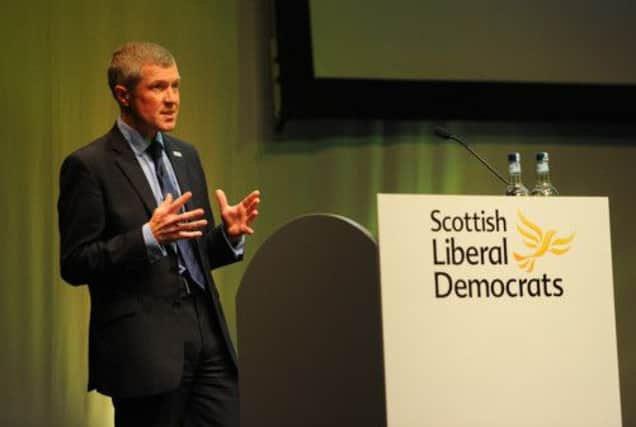Eddie Barnes: Lib Dems’ election strategy


NO party agonises – to the point of self-parody – over how high principle should be applied to individual everyday issues quite like the Liberal Democrats. In Glasgow this week, examples haven’t been hard to find. On Saturday, as the party conference kicked off, delegates met to discuss a motion on whether all new homes should be fitted with sprinklers. As the rest of Glasgow went about its business, shopping and watching football, the SECC rang to the sound of fierce liberal debate. Where should a liberal society draw the line? Should safety, and the potential to stop a death, be favoured over free choice, and an individual’s right to decide? “Sprinklers are fundamentally illiberal!” thundered one young delegate, as he pled with delegates not to press ahead. It’s not hard to mock.
On Monday evening, and on a weightier note, the tortured debate continued – Scottish Lib Dem leader Willie Rennie and English minister for crime prevention Jeremy Browne came to metaphorical blows on the question of minimum pricing on drink. Browne erred on the side of individual choice. In a liberal society, government shouldn’t necessarily be stopping people from making their own decisions on the booze. But Rennie disagreed. Of course he didn’t want to ban the bottle. That wouldn’t be liberal. But, given the impact of drink on wider society, the scales tipped away from liberty and towards government intervention. And so two members of the same party disagreed completely on a key policy issue, both using their party’s core principles to do so.
Advertisement
Hide AdAdvertisement
Hide AdSuch intricate debates over where liberal society ends and state intervention begins have long ensured the party is derided by both Labour and the Conservatives as the nation’s most turgid debating society. And what enrages their opponents all the more is how – as they see it – the Lib Dems exploit their preponderance for both sides of an argument by emphasising whichever one proves most popular in the area where they want people’s votes. This kind of behaviour makes them unfit for the messy business of government, they conclude.
But what the Glasgow conference is revealing is how Nick Clegg is turning this much-mocked Janus-facing into an election strategy for governing. His offer to the public – summed up in the conference slogan “A stronger economy, a fairer society” – is to emphasise whichever part of the Lib Dem dual personality is needed the most. You want a party that will chip the sharp edges off the Tories? We can do that, says Clegg. Or you want a party that can keep watch on free-spending Labour? OK, we can do that instead, he adds.
In the debating halls in Glasgow, the delegates continue to furrow their liberal brows. But Clegg’s achievement – now tested in government – has been to organise that easily mocked liberal indecision into a potential asset. He now has 18 months to sell that idea to a still sceptical public.